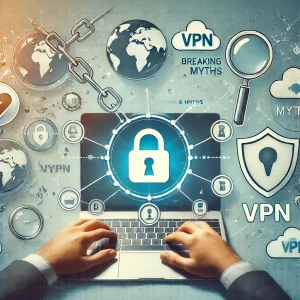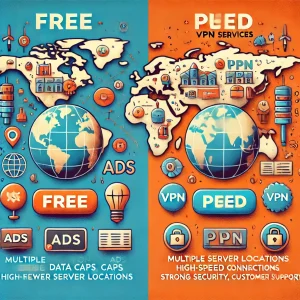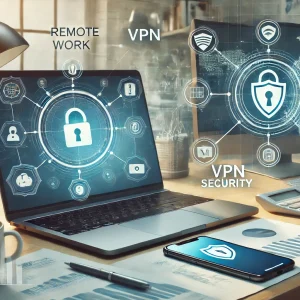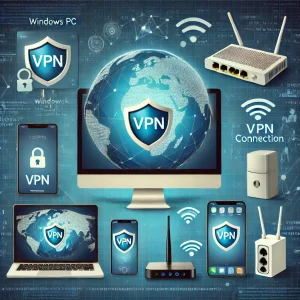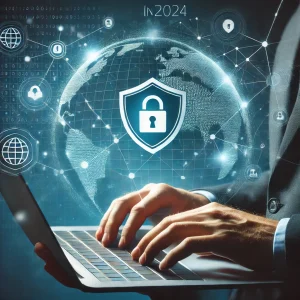In an age where our digital lives are as significant as our physical ones, safeguarding our online presence has never been more critical. Virtual Private Networks (VPNs) have emerged as essential tools in this endeavor, offering a shield against various online threats. This blog explores “The Importance of VPNs for Online Privacy and Security,” delving into their significance, functionality, and benefits.
Understanding VPNs
The Importance of VPNs for Online Privacy and Security cannot be overstated. A Virtual Private Network (VPN) is a service that encrypts your internet connection and routes it through a secure server, masking your IP address and ensuring your online activities remain private. By doing so, VPNs provide a secure tunnel for your data, protecting it from prying eyes, be it hackers, government agencies, or even your Internet Service Provider (ISP).
The Rising Threat Landscape
In 2024, the Importance of VPNs for Online Privacy and Security is highlighted by the increasing sophistication and prevalence of cyber threats. From ransomware attacks and phishing schemes to data breaches and surveillance, the risks to personal and corporate data are immense. The increasing reliance on digital platforms for work, communication, and entertainment amplifies these threats. Therefore, VPNs have become indispensable tools for maintaining online privacy and security.
Key Benefits of Using VPNs
- Enhanced Privacy and Anonymity
- The Importance of VPNs for Online Privacy and Security is evident in their ability to hide your IP address, making it difficult for websites and online services to track your activities.
- VPNs prevent ISPs from monitoring your browsing history and selling your data to advertisers.
- Secure Data Transmission
- VPNs encrypt your internet connection, ensuring that sensitive data, such as passwords, banking details, and personal information, is protected from interception.
- This encryption is particularly crucial when using public Wi-Fi networks, which are notorious for being insecure.
- Bypassing Geo-Restrictions
- The Importance of VPNs for Online Privacy and Security includes their ability to allow users to access content that may be restricted in their region by masking their location.
- This feature is valuable for accessing streaming services, news sites, and social media platforms that may be blocked in certain countries.
- Protection Against Cyber Threats
- VPNs provide a layer of defense against cyber threats by making it harder for hackers to target you.
- They also prevent man-in-the-middle attacks, where attackers intercept and alter communications between you and the websites you visit.
- Securing Remote Work
- As remote work becomes more common, the Importance of VPNs for Online Privacy and Security is clear in how they ensure employees can securely access company resources from anywhere.
- They help in maintaining data integrity and confidentiality, which is crucial for businesses of all sizes.
How VPNs Work
A VPN works by establishing a secure connection between your device and a VPN server. Here’s a step-by-step breakdown of the process:
- Initiation
- When you connect to a VPN, your device communicates with the VPN server using special protocols.
- These protocols establish a secure and encrypted connection, often referred to as a “tunnel.”
- Data Encryption
- All data sent from your device is encrypted before it leaves your device.
- The encrypted data is then sent through the secure tunnel to the VPN server.
- Data Decryption and Forwarding
- The VPN server decrypts the data and forwards it to the internet on your behalf.
- This process masks your IP address, making it appear as though the traffic is originating from the VPN server.
- Receiving Data
- When data is sent back to you, it follows the same path in reverse.
- The VPN server encrypts the data and sends it through the tunnel to your device, where it is decrypted and made accessible.
Choosing the Right VPN
With numerous VPN providers available, selecting the right one is crucial for ensuring the Importance of VPNs for Online Privacy and Security. Here are some factors to consider:
- Privacy Policy
- Ensure the VPN provider has a strict no-logs policy, meaning they do not store any records of your online activities.
- Check for transparency reports and third-party audits that validate their privacy claims.
- Security Features
- Look for robust encryption standards, such as AES-256.
- Additional security features like a kill switch, DNS leak protection, and multi-hop connections can enhance your security.
- Speed and Performance
- VPNs can sometimes slow down your internet connection. Choose a provider known for maintaining high speeds.
- Opt for a provider with a large network of servers to distribute load and reduce latency.
- Compatibility
- Ensure the VPN is compatible with all your devices, including smartphones, tablets, and computers.
- Check if the provider offers simultaneous connections, allowing you to protect multiple devices under a single subscription.
- Customer Support
- Reliable customer support is essential for addressing any issues that may arise.
- Look for providers that offer 24/7 support through multiple channels, such as chat, email, and phone.
VPNs in the Corporate World
Businesses, regardless of size, face unique cybersecurity challenges. The Importance of VPNs for Online Privacy and Security in the corporate world cannot be overstated:
- Protecting Sensitive Information
- VPNs ensure that sensitive corporate data, such as intellectual property and customer information, is encrypted during transmission.
- This protection is vital for maintaining the trust of clients and partners.
- Securing Remote Access
- With remote work becoming the norm, VPNs allow employees to securely access company networks from anywhere.
- This access ensures that remote work does not compromise security.
- Compliance and Regulation
- Many industries have stringent data protection regulations, such as GDPR and HIPAA.
- VPNs help businesses comply with these regulations by safeguarding data during transmission and ensuring proper access controls.
Future Trends in VPN Technology
As cyber threats evolve, so too does VPN technology. Here are some trends that underscore the Importance of VPNs for Online Privacy and Security in 2024:
- Integration with AI and Machine Learning
- AI can enhance VPN security by detecting and responding to threats in real-time.
- Machine learning algorithms can optimize server selection and improve connection speeds.
- Quantum-Resistant Encryption
- With the advent of quantum computing, traditional encryption methods may become vulnerable.
- VPN providers are exploring quantum-resistant encryption techniques to future-proof their services.
- Decentralized VPNs
- Decentralized VPNs (dVPNs) leverage blockchain technology to distribute network infrastructure.
- This decentralization enhances privacy and reduces the risk of centralized points of failure.
- Enhanced User Experience
- VPNs are becoming more user-friendly, with streamlined interfaces and automated features.
- These improvements make it easier for non-technical users to protect their online privacy and security.
Conclusion
In conclusion, the Importance of VPNs for Online Privacy and Security in 2024 cannot be emphasized enough. By encrypting your internet connection and masking your IP address, VPNs protect your data from a myriad of cyber threats. Whether you are an individual looking to safeguard your personal information or a business aiming to secure corporate data, a reliable VPN is crucial. As cyber threats continue to evolve, staying informed and adopting robust security measures like VPNs will be essential in maintaining your digital safety.
